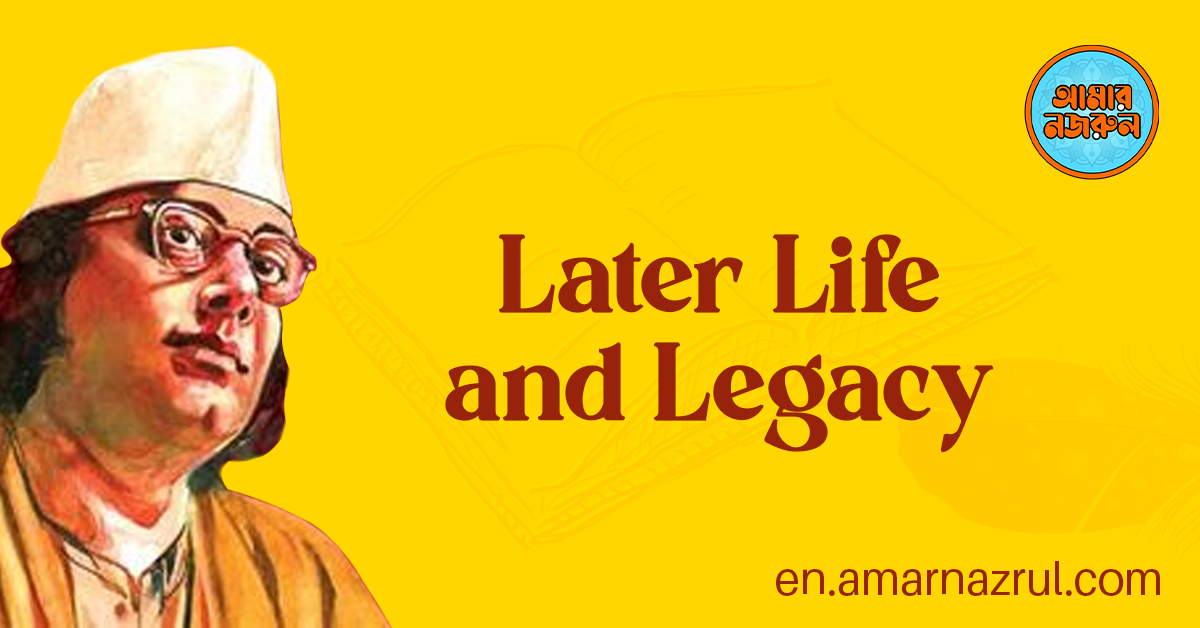Kazi Nazrul Islam, often referred to as the “Rebel Poet” of Bengal, was a prominent Bengali poet, writer, musician, and revolutionary. His later life and enduring legacy are a testament to his unwavering spirit, artistic contributions, and impact on Bengali culture, literature, and society. Born on May 24, 1899, in Churulia, Bengal Presidency (now in West Bengal, India), Nazrul Islam’s journey through his later years and the mark he left on the world are subjects of admiration and study.
I. Later Life and Personal Struggles
As Nazrul Islam’s fame grew, his later life was marked by both personal challenges and artistic achievements. After the partition of Bengal in 1947, he moved to Dhaka, which became his final home. Despite his initial admiration for the idea of Pakistan, he soon became disillusioned with the cultural suppression of Bengali language and identity by the central government. This marked a turning point in his life, as he began to express his concerns through his writings and activism.
- Political Involvement: Nazrul Islam’s involvement in politics intensified during his later years. He openly criticized the Pakistani government’s attempts to impose Urdu as the sole national language, sparking protests and movements for linguistic rights. His fiery speeches and writings attracted the attention of both supporters and opponents, solidifying his reputation as a fearless advocate for justice.
- Health Challenges: As his activism intensified, Nazrul Islam’s health began to decline. He suffered from various ailments, including Parkinson’s disease, which gradually affected his ability to speak and write. Despite these challenges, he continued to compose poems and songs, relying on his wife, Promila Devi, and his dedicated followers to transcribe his thoughts.
II. Artistic Contributions
Nazrul Islam’s later life was also marked by his continued artistic output. Despite his health struggles, he remained a prolific writer and composer, leaving behind a treasure trove of literary and musical works that continue to inspire generations.
- Literary Works: During his later years, Nazrul Islam explored a wide range of themes in his writings. His poetry evolved to reflect his changing perspectives on nationalism, humanism, and spirituality. He composed numerous ghazals, poems, and essays that showcased his deep philosophical contemplations and his ability to touch the hearts of his readers.
- Musical Legacy: A gifted musician, Nazrul Islam’s musical compositions played a significant role in preserving his legacy. He created a unique genre known as “Nazrul Sangeet” (Nazrul’s Music), blending classical, folk, and modern elements. His songs often conveyed messages of unity, freedom, and love. His compositions continue to be performed by artists across the world, keeping his spirit alive through the power of music.
III. Enduring Legacy
Kazi Nazrul Islam’s impact on literature, music, and societal change extends far beyond his time. His later life and legacy have left an indelible mark on various aspects of Bengali culture and society.
- Cultural Identity: Nazrul Islam’s unyielding commitment to his Bengali roots and language has made him a cultural icon. His resistance against linguistic oppression and his celebration of Bengali culture have contributed to a stronger sense of identity among Bengalis.
- Social Relevance: His writings on social justice, equality, and human rights continue to resonate with contemporary issues. His themes of inclusivity and the fight against discrimination remain relevant, inspiring people to stand up against injustice.
- Literary and Musical Impact: Nazrul Islam’s literary and musical contributions continue to influence artists, writers, and musicians. His works have inspired countless creative endeavors that explore similar themes of freedom, love, and social change.
- Symbol of Resistance: Nazrul Islam’s life story serves as a symbol of resistance and courage. His defiance in the face of adversity has become a source of inspiration for individuals fighting against oppression worldwide.
IV. Commemorations and Honors
To honor his contributions, various institutions and events have been dedicated to Kazi Nazrul Islam’s memory. These efforts ensure that his legacy remains alive and thriving.
- Nazrul Academy: The Nazrul Academy in Dhaka, Bangladesh, was established to preserve and promote his works. It plays a vital role in organizing events, seminars, and research on Nazrul Islam’s life and writings.
- Nazrul Jayanti: Nazrul Jayanti, his birth anniversary, is celebrated with great enthusiasm in both Bangladesh and West Bengal. Cultural programs, discussions, and performances commemorate his life and contributions.
- Literary and Cultural Events: Universities, cultural organizations, and literary societies often organize events dedicated to discussing Nazrul Islam’s literary and musical heritage.
V. Conclusion
Kazi Nazrul Islam’s later life was characterized by his unwavering commitment to justice, his artistic excellence, and his indomitable spirit. Through his writings, music, and activism, he left an indelible mark on Bengali culture and beyond. His legacy continues to inspire individuals to embrace their cultural identity, fight against oppression, and create art that reflects the human experience. As we reflect on his later years, we are reminded that his journey and contributions are a timeless source of inspiration for generations to come.
